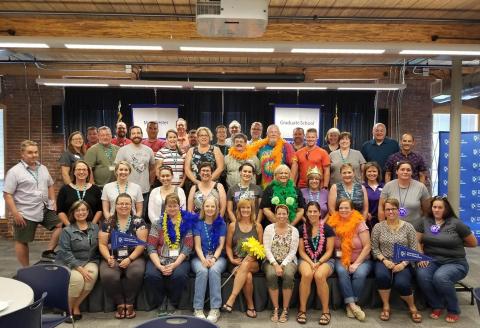UNH Prepares Educators to Meet State Requirements in STEM

Many New Hampshire educators are teaching computer science for the first time this fall, thanks to a regional partnership between the University of New Hampshire and Code.org. This past summer, over 40 educators took part in a week-long professional learning program on the UNH Manchester campus. Attendees came from across the state—from as far north as Pittsburg and as far south as Salem—as well as from Maine, Vermont and Massachusetts. Most had little general experience in computer science (CS), let alone experience with teaching the subject.
Although many of the teachers came in nervous, their doubts were soon eased. The facilitators were New Hampshire CS educators who have been extensively trained by Code.org, which provides the leading curriculum for K-12 computer science in the largest school districts in the country. Through its generous partners (including Microsoft and Facebook), Code.org funded the educators’ participation in this event for those schools whose administrators committed to offering either CS Discoveries (grades 6-10) or CS Principles (grades 9-12) during the 2019-20 school year.
Initiative HB1674, signed into law last summer by Governor Sununu, requires all NH schools to offer computer science as part of an adequate education by the 2020-21 school year. To help prepare schools in fulfilling this requirement, UNH is working hard to ensure educators have the tools and support they need.
Participants learned the curriculum by changing roles between students and educators. Small groups were assigned to jointly prepare and deliver lessons to their peers, who played the role of students. The whole group then reflected on each lesson and discussed techniques for teaching various computer science skills. These educators will collaborate and receive additional training throughout the year during four additional Saturday workshops.
The participants were welcomed on the first day by Dean of UNH Manchester Mike Decelle and UNH Vice Provost for Outreach and Engagement Ken La Valley. Decelle talked about initiatives in Manchester, such as the Advanced Regenerative Manufacturing Institute (ARMI) and how the work of these educators will help prepare students for jobs of the future.
La Valley confirmed UNH’s commitment to providing high quality professional development in science, technology, engineering, math and computer science (STEM). “As the state’s flagship public university, UNH is committed to training teachers in the latest technology, especially with the new state requirements in computer science. It has been wonderful to witness teachers from across New Hampshire embrace lifelong learning to best prepare their students for their futures,” he said.
